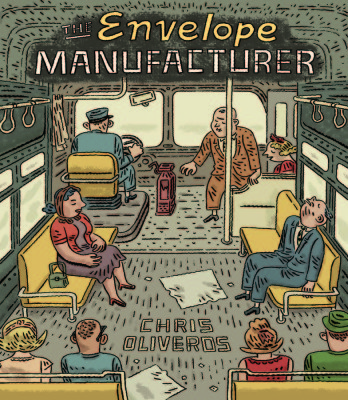The importance of Chris Oliveros to the world of alternative comics publishing is probably impossible to overstate. As the founder and publisher of Montreal’s Drawn & Quarterly, Oliveros oversaw work by such seminal cartoonists as Chester Brown, Julie Doucet, Seth, and Adrian Tomine, among many others, and his successes have been instrumental in carving out a cultural space for offbeat, alternative, and so-called “serious” comics. In fact, so closely has Oliveros been identified with both Drawn & Quarterly and comics publishing in general, that it was something of a surprise when he stepped down as publisher in 2015 to focus on his own work.

The Envelope Manufacturer
Chris Oliveros
Self-published
$19.95
paper
104pp
9781770462298
Richly evocative yet narratively and visually unstraightforward, what exactly happens in The Envelope Manufacturer is something of a mystery. This is not least due to the disorienting and dreamlike narrative perspective, which never seems to settle on a stable or even realistic point of view. Instead we get scenes of businessmen jumping off buildings and floating through the air while plotting to turn everything around, or hostile encounters on the bus between people who may or may not be co-workers. Oliveros’s page design, similarly, adds to the narrative uncertainty, as speech bubbles weave through the page, creating the sense of lost snippets of dialogue coming to us from the past like ghostly radio waves.
This clever strategy is accentuated by Oliveros’s decision to focus a large number of panels not on his ephemeral and in some sense everyman – and everywoman – characters, but instead on their material world of analogue and largely obsolete machinery. As such, the book’s panels are filled with real-world objects like metal lunchboxes and stovetop coffee makers, in addition to various absurd-looking gadgets and doodads, all of them drawn in inventive detail. Oliveros’s cityscapes, similarly, which make up the majority of the illustrations, are affectionately drawn to evoke a lost time of inner-city daily life and manufacturing – a time, that is, when men wore suits and had haircuts, and when a city’s downtown was more than simply an outdoor shopping mall.
The book’s visual texture is complemented by its physical form; it is compact, floppy, and printed on coarse paper that emphasizes the narrative’s focus on the loss of materiality in an increasingly modern and technologically advanced world. In a current market dominated by beautifully produced high-quality hardback comics, it is therefore only fitting that Oliveros’s The Envelope Manufacturer itself, which has been nearly twenty years in the making, seems to belong in style, theme, and publication values to a slightly earlier era of comics. With The Envelope Manufacturer, Oliveros has finally begun to catch up to the world he helped create. mRb






0 Comments